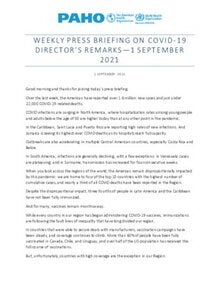Weekly Press Briefing on COVID-19: Director's Opening Remarks, September 1, 2021

|
Good morning and thanks for joining today’s press briefing. Over the last week, the Americas have reported over 1.6 million new cases and just under 22,000 COVID-19-related deaths. COVID infections are surging in North America, where hospitalization rates among young people and adults below the age of 50 are higher today than at any other point in the pandemic. In the Caribbean, Saint Lucia and Puerto Rico are reporting high rates of new infections. And Jamaica is seeing its highest-ever COVID deaths as its hospitals reach full capacity. Outbreaks are also accelerating in multiple Central American countries, especially Costa Rica and Belize. In South America, infections are generally declining, with a few exceptions: in Venezuela cases are plateauing, and in Suriname, transmission has increased for four consecutive weeks. When you look across the regions of the world, the Americas remain disproportionally impacted by this pandemic: we are home to four of the top 10 countries with the highest number of cumulative cases, and nearly a third of all COVID deaths have been reported in the Region. Despite the disproportional impact, three fourths of people in Latin America and the Caribbean have not been fully immunized. And for many, vaccines remain months away. While every country in our region has begun administering COVID-19 vaccines, immunizations are following the fault lines of inequality that have long divided our region. In countries that were able to secure deals with manufacturers, vaccination campaigns have been steady, and coverage continues to climb. More than 60% of people have been fully vaccinated in Canada, Chile, and Uruguay, and over half of the US population has received the full course of vaccinations. But, unfortunately, countries with high coverage are the exception in our Region. Delays in production, export bans and limited vaccine supplies have meant that many countries are still awaiting the doses they expected months ago. More than a third of the countries in our region have yet to vaccinate 20% of their populations. And in some places, coverage is much lower. Vaccination rates remain in the teens in several Caribbean and South American countries and coverage is still in the single digits in Central American nations like Guatemala, Honduras, and Nicaragua. Not to mention Haiti and Venezuela, where fragile health systems and political challenges have further delayed immunizations. We need to deliver an additional 540 million doses to ensure that every country in the Americas can cover at least 60% of their population. So, we must expand vaccine access in our region, especially in the places that are lagging behind. So, with this in mind, I want to lay out three priorities to accelerate vaccine coverage in our region. First, we need more vaccine donations. And we urge countries around the world with excess doses to quickly share these with our region, where they will have life-saving impact. As we continue to face delays in vaccine production, donations remain the best and the fastest way to get vaccines out to more people. Today, some countries are already rolling out boosters to vaccinated persons even as most people in our region have yet to receive a single dose. We remind countries everywhere that the best way to protect against variants of concern, like the Delta variant, is to ensure that more people are fully vaccinated everywhere. Our best option is to make the most of available doses, right now. So, this brings me to my second point: we need to let public health, and not politics, guide our pandemic response. As vaccines remain limited, countries should prioritize doses for the most vulnerable, like the elderly, health workers and those living with pre-existing conditions. Too many of these vulnerable groups have yet to be vaccinated, even as vaccination campaigns are reaching others who are less at risk. So, we continue to urge countries to follow the science, both by designing campaigns that protect the most vulnerable and by applying public health measures that can bring down transmission. And finally, we need countries to ensure that vaccines are in arms as soon as they arrive. While countries are administering doses quickly, this is just the beginning. As they receive more – and larger – shipments, countries must ensure the logistics systems can absorb these doses and that the cold chain is assured all along the way. It also means hiring and training more health workers to deliver these vaccines, and organizing communications campaigns so people have all the information that they need so they know when and where to get vaccinated. PAHO is also helping countries across all these preparations – and we’re working with countries to overcome one of the biggest hurdles of COVID vaccinations: syringes. Yes, syringes. PAHO’s Revolving Fund has secured 80 million syringes this year, and we are working with countries to monitor demand and to ensure that they have enough syringes to administer the COVID-19 vaccines. Our goal is to protect as many people as possible, and as quickly as possible with COVID-19 vaccines. And to achieve this, we must work together to maximize the impact of COVID vaccinations and to significantly improve access. PAHO’s Revolving Fund is already pooling demand from countries in Latin America and the Caribbean, to secure more doses in the coming months and to address the current gaps. We are also thinking ahead and making plans to significantly improve regional vaccine manufacturing capacity. So, just last week, we launched a new platform that convenes partners around a shared vision of boosting state-of-the-art vaccine production in Latin America and the Caribbean. The Americas have a successful legacy of immunization, grounded on cooperation. We must embrace this as our way out of the pandemic.
|
